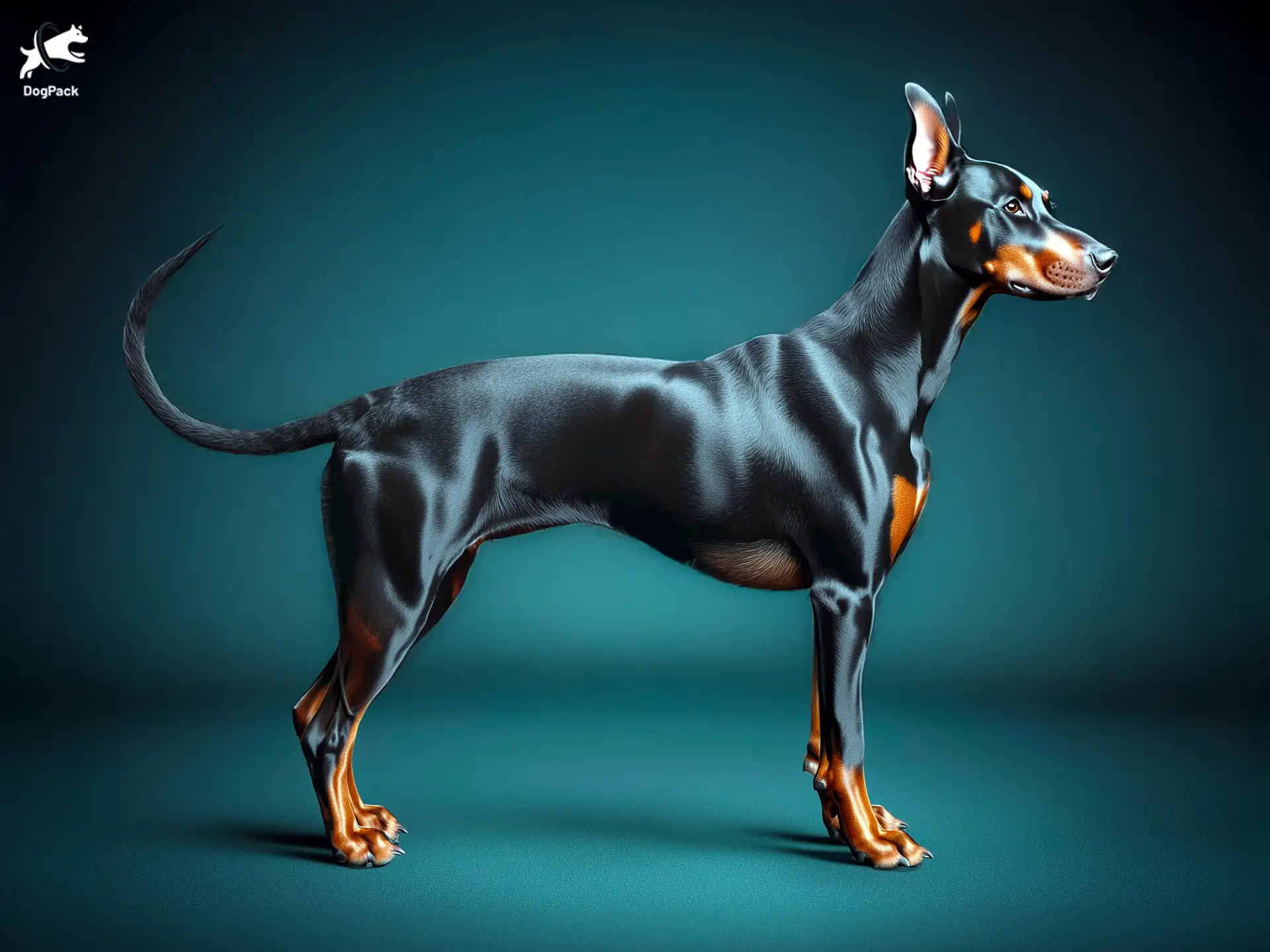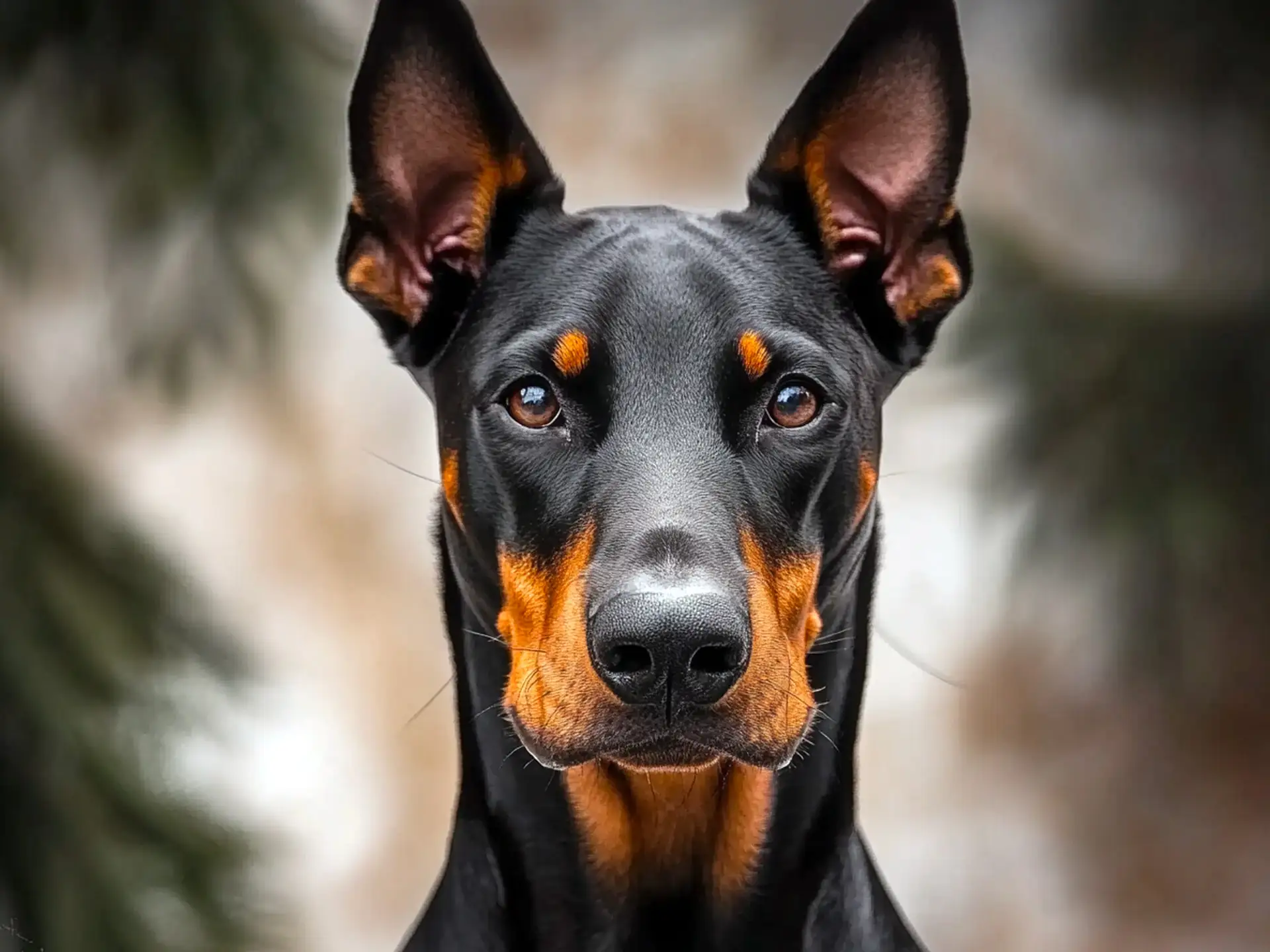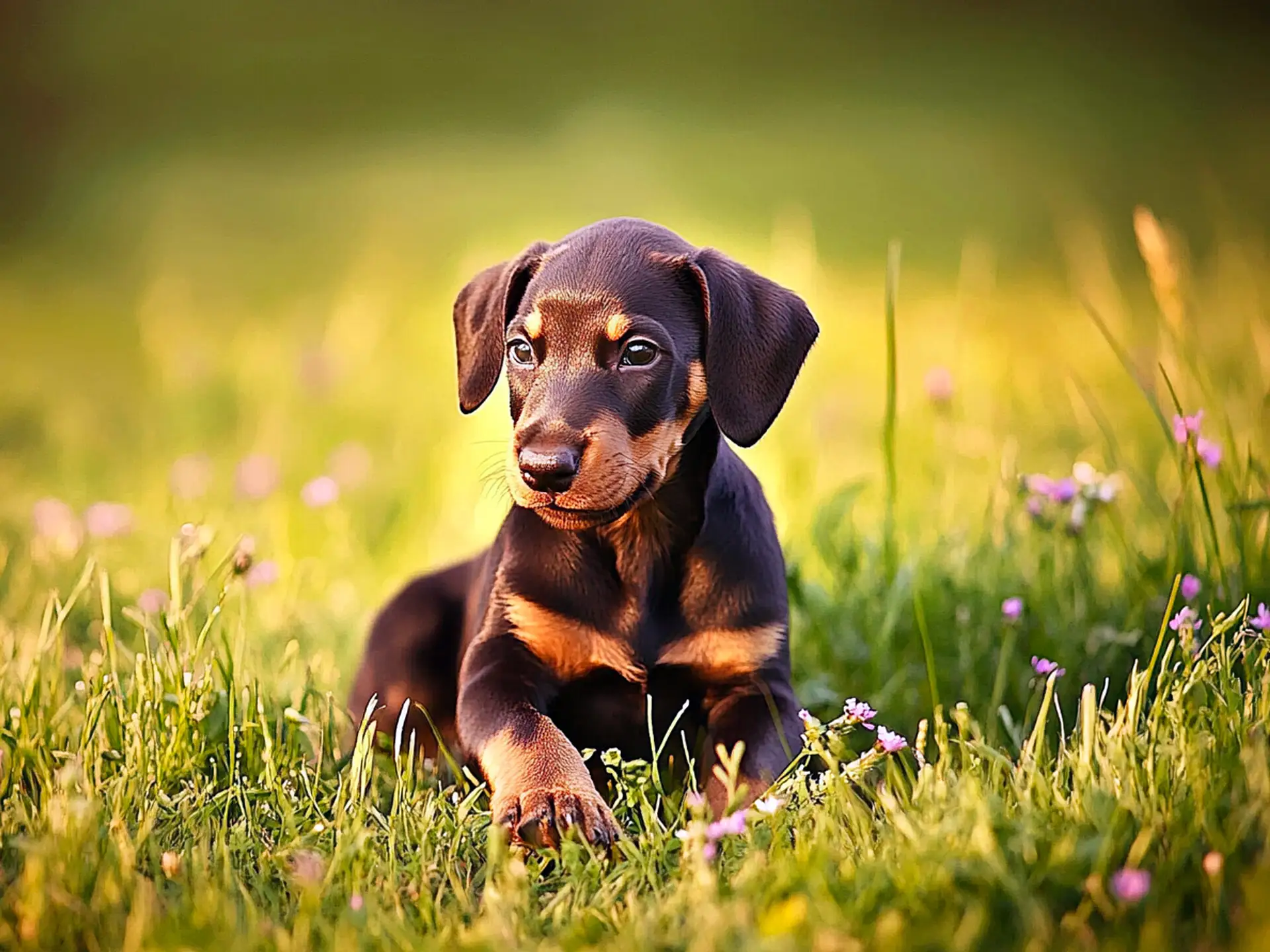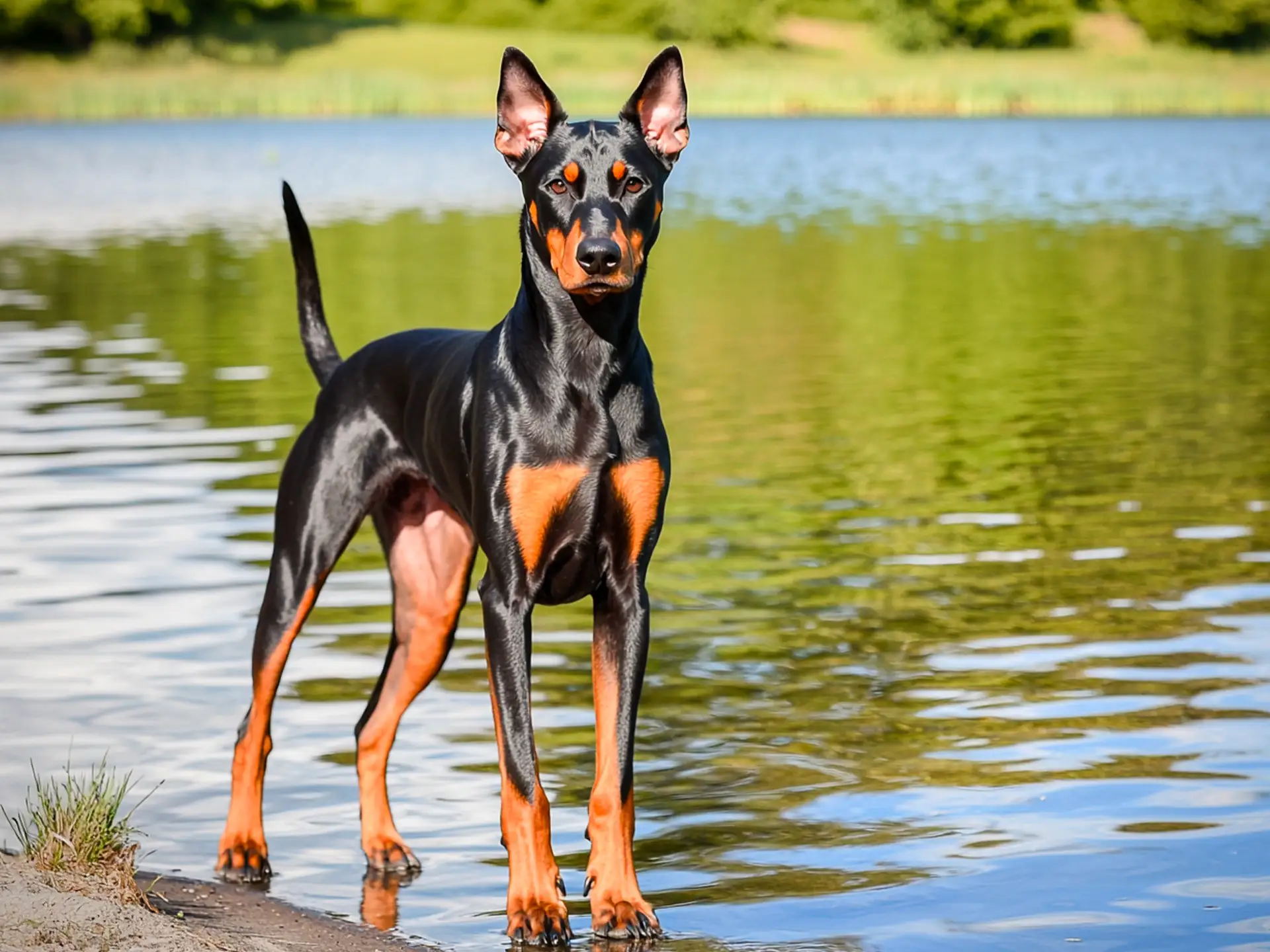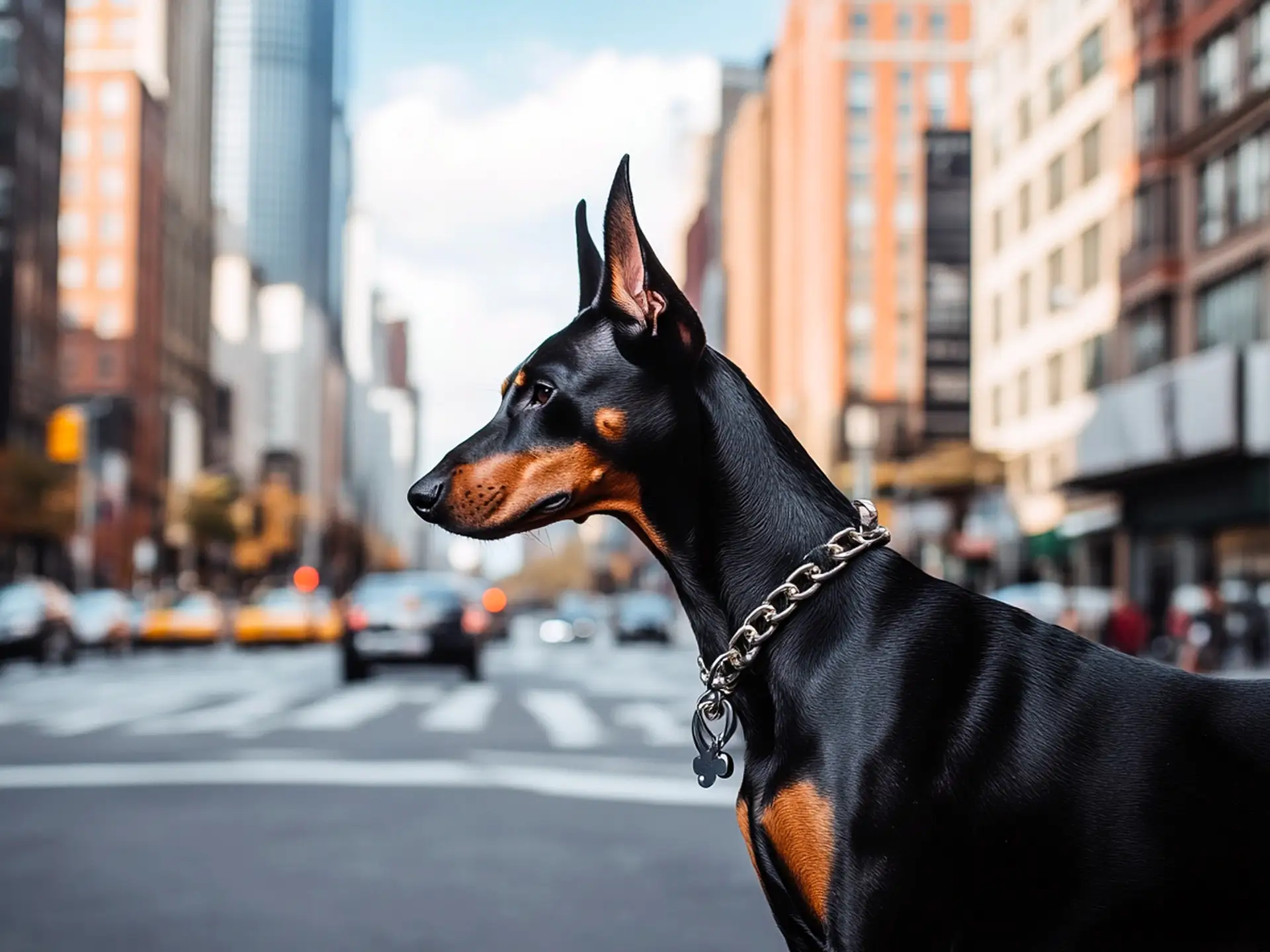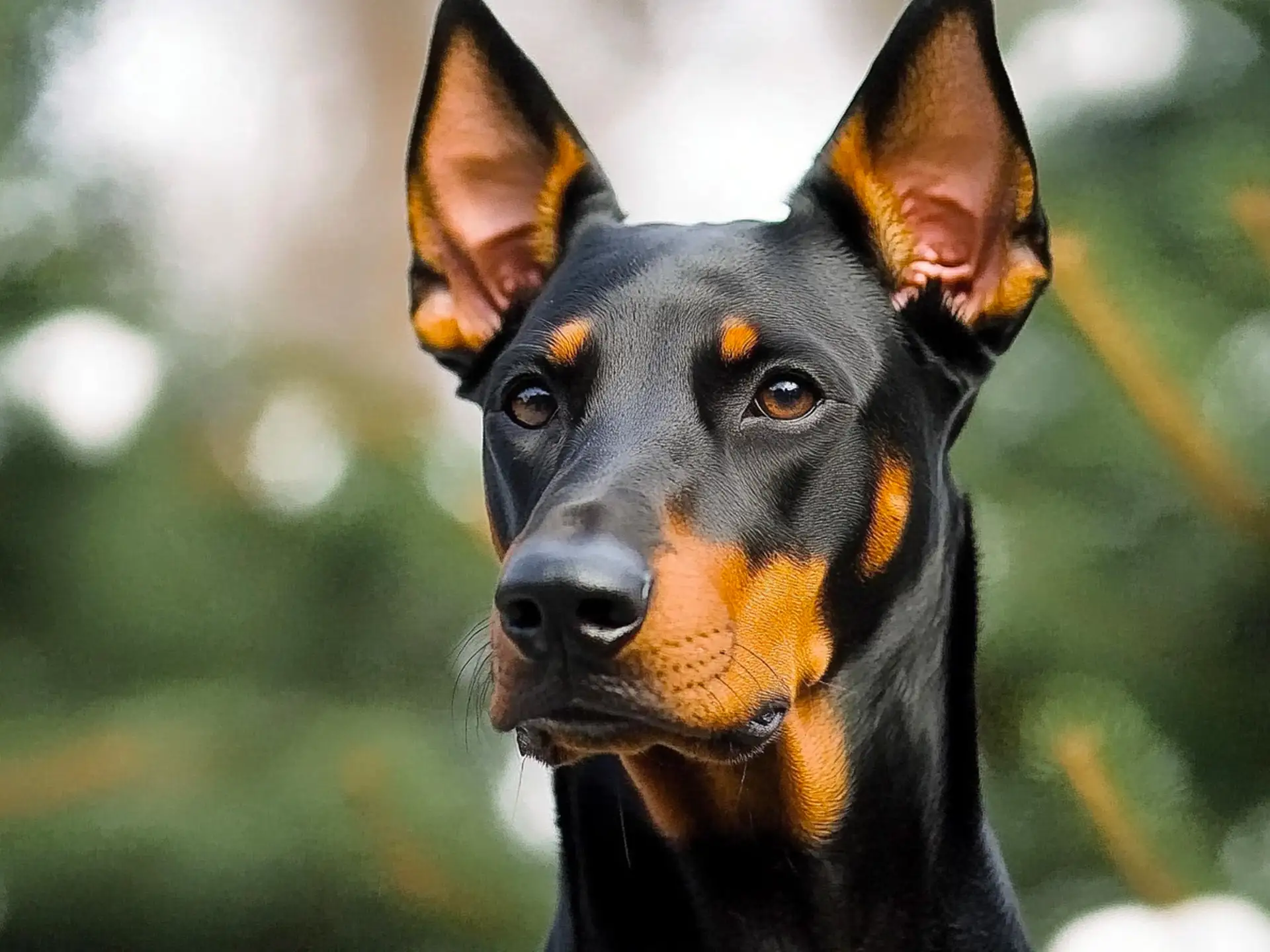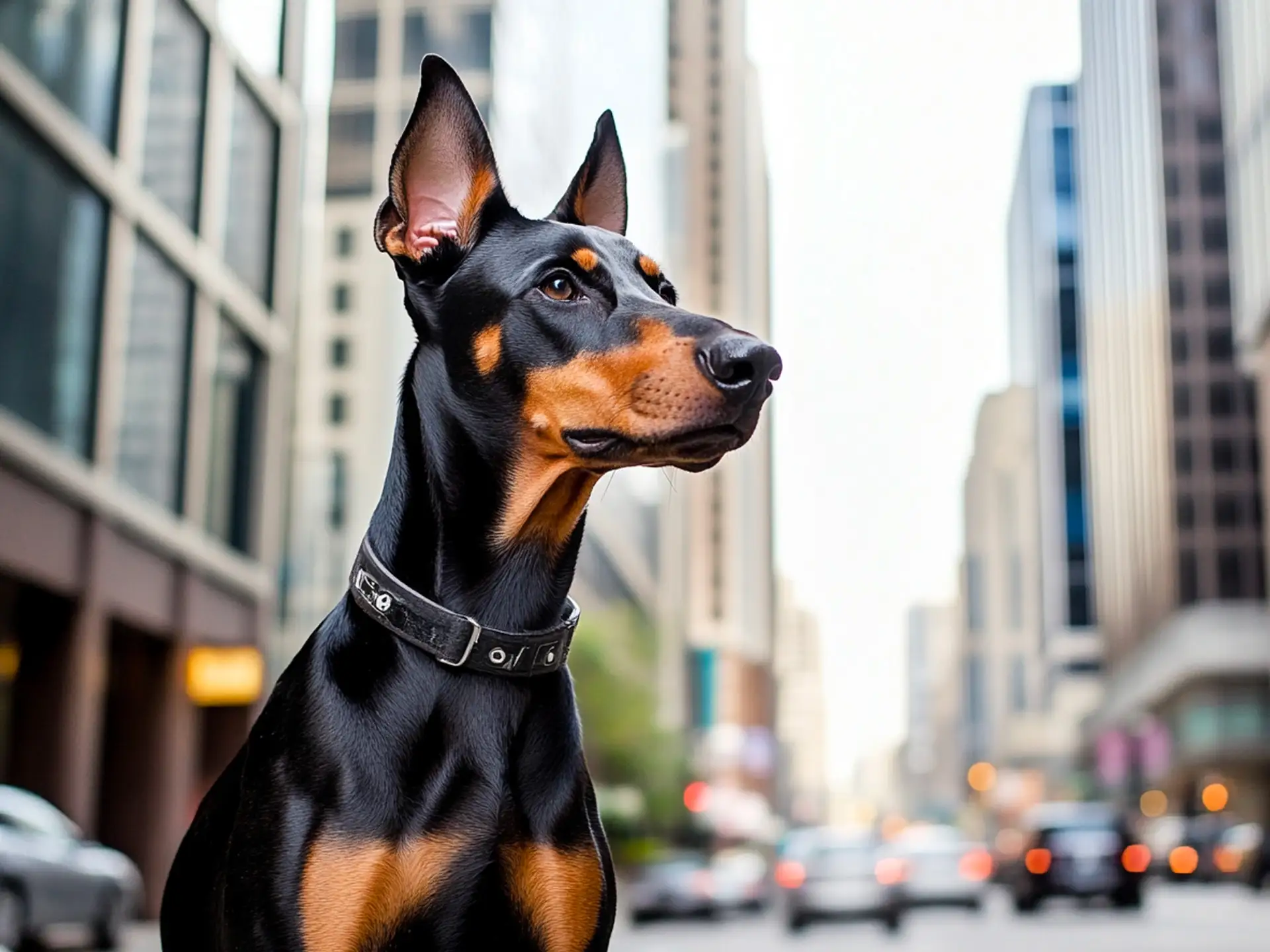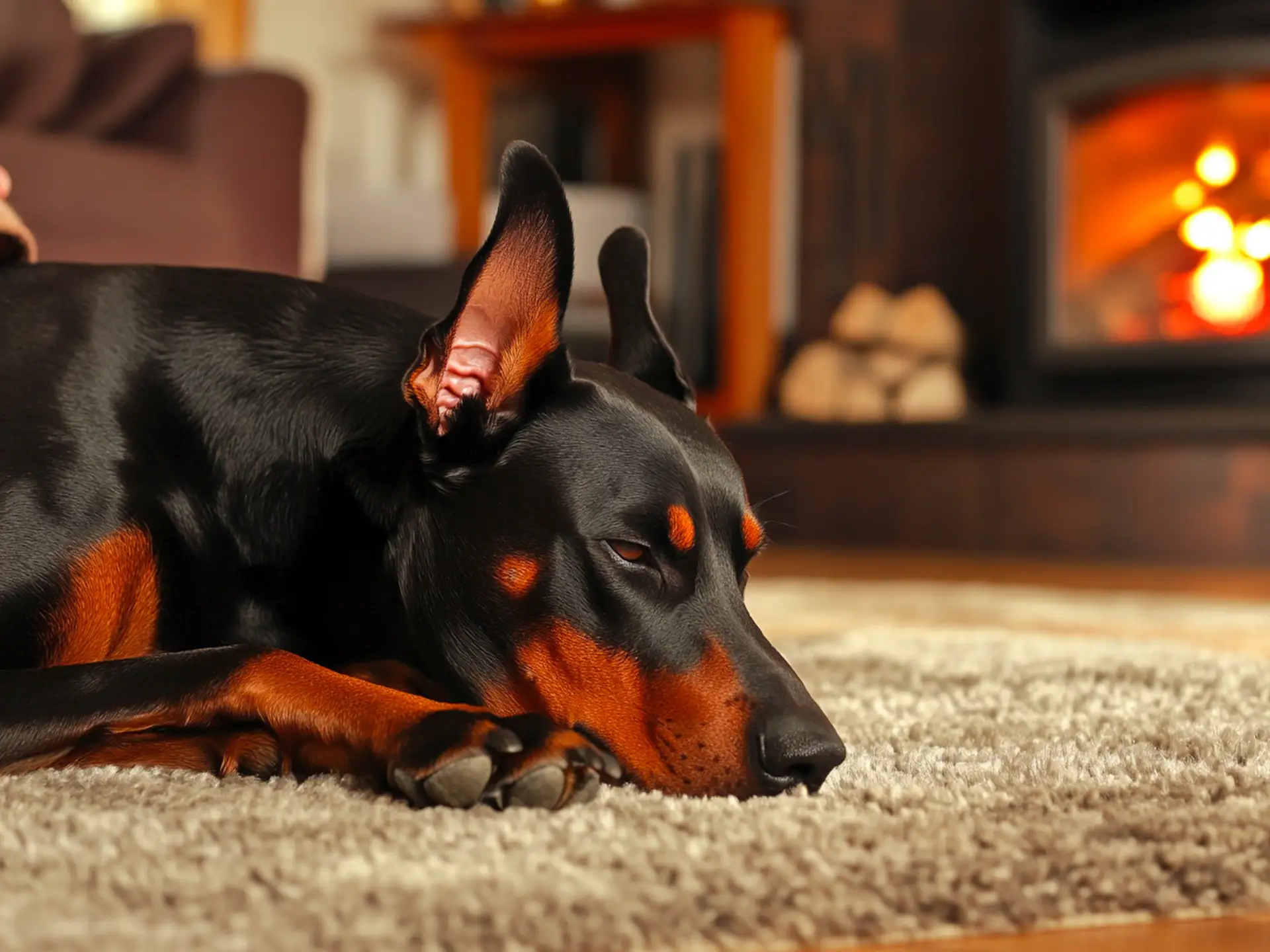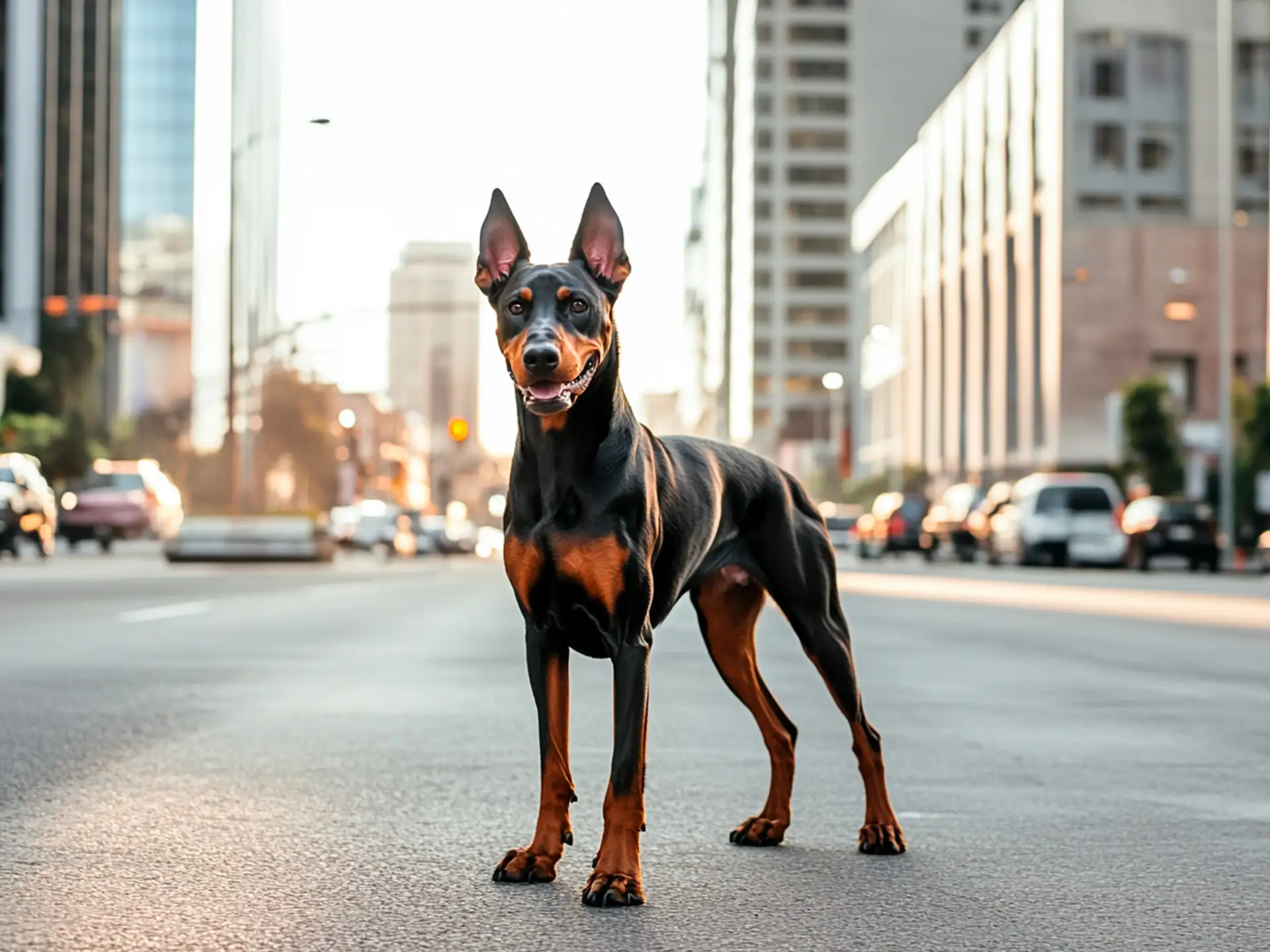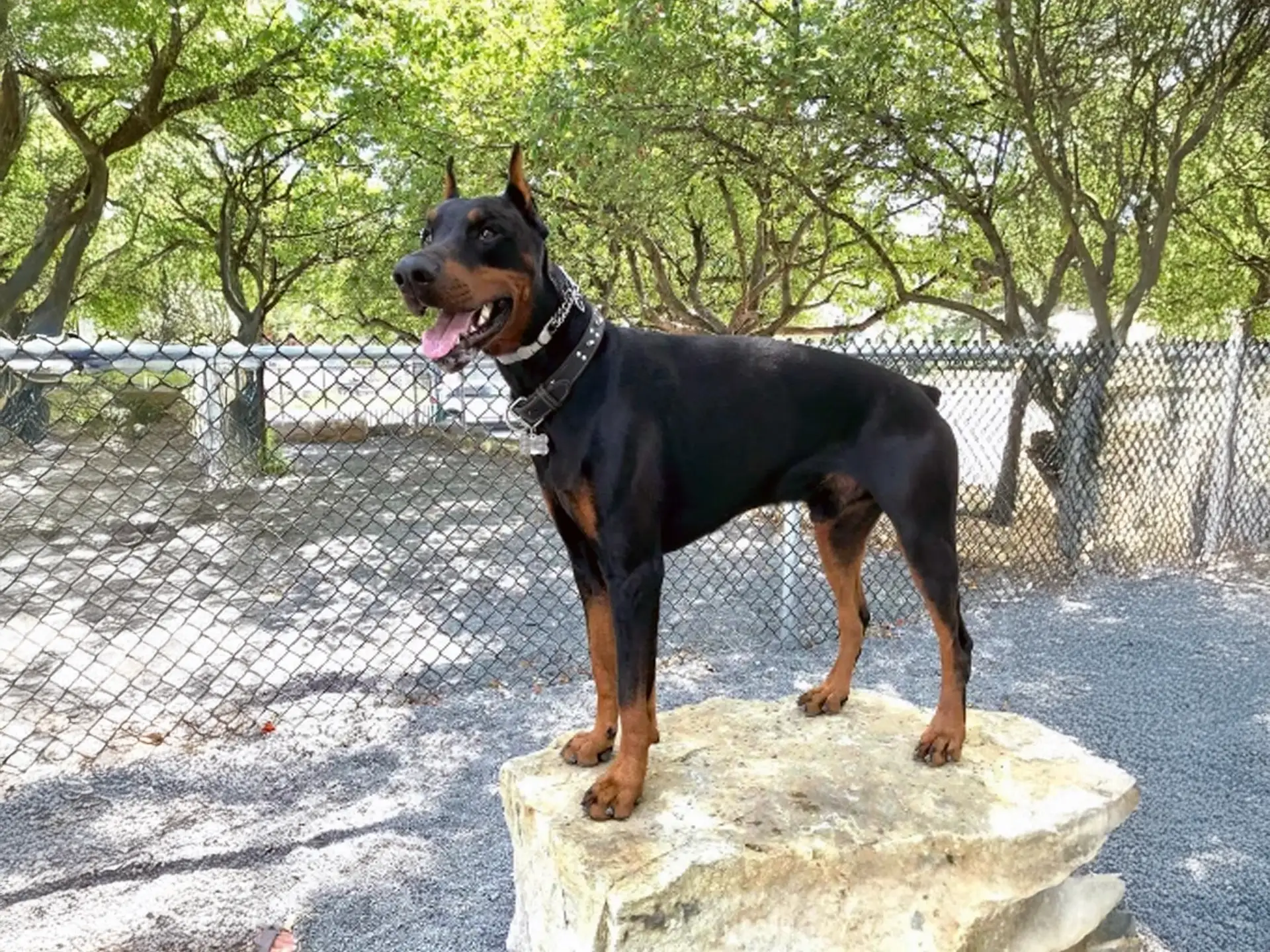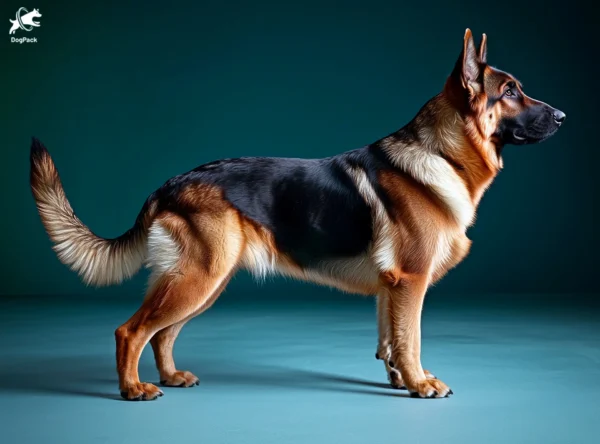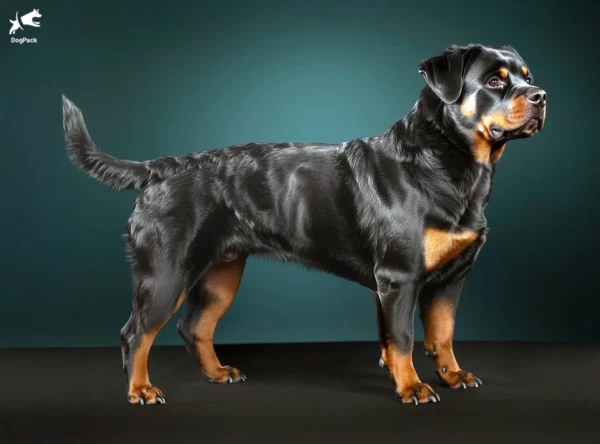Doberman Pinscher Dog Breed Info & Overview
The Doberman Pinscher is a loyal and intelligent guardian with a sleek, athletic build and a heart full of devotion. Known for their keen intellect and protective instincts, these dogs excel not only as watchful protectors but also as affectionate family members. Thriving on companionship and adventure, Dobermans bring both loyalty and love, making them ideal for families who seek a devoted and energetic companion.
Characteristics
Pictures
Breed History
Did you know that the Doberman Pinscher owes its existence to a tax collector? In the late 19th century, a German named Karl Friedrich Louis Dobermann wanted a loyal companion to accompany him on his rounds. He needed a dog that was not only protective but also intelligent and fearless.
Combining breeds like the Rottweiler, German Pinscher, and Black and Tan Terrier, Dobermann created a new breed that embodied strength and loyalty. The Doberman quickly gained popularity for its versatility and became a favorite among police and military forces.
Over the years, the breed has evolved, but it hasn’t lost its edge. Today’s Dobermans are still renowned for their courage and devotion, making them exceptional working dogs and cherished family members.
Temperament, Personality
Don’t let their formidable appearance fool you; Dobermans are real softies at heart. These dogs are incredibly affectionate with their families and form deep bonds with their human companions. Their loyalty is legendary, often earning them the title of “velcro dogs” because they love to stick close to their people.
When it comes to kids, Dobermans can be wonderful playmates, especially if raised alongside them. They’re energetic and enjoy interactive games, but supervision is key to ensure everyone plays nicely. Early socialization is crucial to help them get along with other pets and reduce any territorial tendencies.
Strangers might get a wary glance, but with proper introductions, Dobermans can be polite and well-mannered. Their natural protective instincts make them excellent watchdogs, but training and socialization help channel those instincts appropriately. A well-adjusted Doberman is confident, alert, and a joy to be around.
Physical Characteristics
Sleek, muscular, and athletic—Dobermans are built for agility and strength. They have a distinctive appearance with a wedge-shaped head, almond-shaped eyes, and erect ears, which are often cropped in some countries (though this practice is becoming less common). Their bodies are lean yet powerful, exuding elegance and confidence.
The coat of a Doberman is short, smooth, and comes in colors like black, red, blue, and fawn, usually with rust markings above the eyes, muzzle, chest, and legs. Their low-maintenance coat contributes to their polished look without requiring extensive grooming.
Standing tall at 24 to 28 inches (61–71 cm) and weighing between 60 to 100 pounds (27–45 kg), the Doberman Pinscher is a medium-large breed. Their athletic build isn’t just for show; these dogs are capable of impressive speed and endurance, making them excellent companions for active lifestyles.
Health Issues
Like all breeds, Dobermans have their share of health concerns. One of the most common is dilated cardiomyopathy (DCM), a heart condition that can be serious if not detected early. Regular veterinary check-ups and heart screenings are essential to monitor their cardiovascular health.
Another concern is von Willebrand’s disease, a blood clotting disorder. Genetic testing can identify carriers and help responsible breeders reduce its prevalence. Hip dysplasia is also seen in the breed, so maintaining a healthy weight and providing joint supplements can be beneficial.
Wobbler syndrome, a neurological condition affecting the spine, can occur in Dobermans. Being aware of early signs like unsteady gait or neck pain allows for prompt treatment. Overall, a balanced diet, regular exercise, and routine vet visits will go a long way in keeping your Doberman healthy and happy.
Grooming Needs
Good news for those who aren’t fans of endless grooming sessions: Dobermans are relatively low-maintenance in this department. Their short, sleek coat requires minimal upkeep—a weekly brush with a rubber grooming mitt or soft bristle brush is usually enough to keep them looking sharp.
Bathing can be done as needed, typically every few months unless they get into something messy. Their nails grow quickly, so regular trimming is important to prevent overgrowth and discomfort. Don’t forget routine dental care; brushing their teeth several times a week helps prevent dental disease.
Ears should be checked regularly for signs of infection or wax buildup, especially if they are uncropped and floppy. Overall, grooming a Doberman is straightforward, making it easier to focus on what they love most—spending quality time with you.
Exercise Requirements
If you’re an active person, the Doberman Pinscher might just be your perfect workout buddy. These dogs have high energy levels and thrive on physical activity. Aim for at least 1 to 2 hours of exercise each day to keep them mentally and physically satisfied.
Activities like brisk walks, jogging, and agility training are excellent ways to burn off their energy. They also enjoy mental challenges, so consider incorporating obedience training or puzzle toys into their routine. Remember, a bored Doberman can become destructive, so keeping them engaged is key.
Dog sports like Schutzhund, tracking, or even flyball can provide both mental stimulation and physical exercise. Whether it’s a game of fetch or a hike in the woods, your Doberman will be happiest when they’re active and spending time with you.
Training Tips
Training a Doberman is both a rewarding and essential part of ownership. Their intelligence and eagerness to please make them quick learners, but they also require a confident and consistent handler. Positive reinforcement techniques work best—think praise, treats, and plenty of affection.
Early socialization is crucial to help them become well-rounded adults. Expose your Doberman to different people, places, and situations to build their confidence. Consistency is key—set clear boundaries and stick to them to prevent confusion and establish trust.
Be patient but firm. Dobermans can be sensitive, so harsh training methods may backfire. Instead, focus on building a strong bond through mutual respect. Enrolling in obedience classes can also be beneficial, providing structured learning and social opportunities.
Nutrition, Diet
Feeding a Doberman Pinscher requires attention to their high energy levels and muscular build. A diet rich in high-quality protein supports muscle maintenance, while balanced fats provide the energy they need. Look for dog foods that list meat as the first ingredient and avoid fillers like corn and wheat.
Portion control is important to prevent obesity, which can exacerbate health issues like hip dysplasia. Typically, an adult Doberman will consume between 2.5 to 3.5 cups of dry food per day, split into two meals. However, the exact amount can vary based on their age, activity level, and metabolism.
Some Dobermans may benefit from diets that support heart health, given their predisposition to cardiac issues. Omega-3 fatty acids and taurine supplements can be beneficial but consult your veterinarian before making any significant dietary changes. Always ensure fresh water is available, especially after exercise.
Adoption, Breeders
If you’re considering adding a Doberman Pinscher to your family, it’s crucial to find a reputable breeder or adoption agency. Reputable breeders will perform health screenings for genetic conditions like DCM and von Willebrand’s disease. They should provide health clearances and allow you to meet the puppy’s parents.
Adopting is another wonderful option. Organizations like the Doberman Pinscher Club of America offer resources for finding rescue Dobermans in need of homes. Rescue dogs can be just as loving and loyal, and you’ll be giving a dog a second chance at a happy life.
Avoid purchasing from puppy mills or pet stores, as these sources often prioritize profit over the well-being of the dogs. Doing your homework ensures you bring home a healthy, well-adjusted Doberman that will be a joy for years to come.
Family Pet?
Dobermans can make excellent family pets for the right household. They are affectionate and form strong bonds with their human family members. Their protective nature means they often watch over children, but supervision is important to ensure safe interactions, especially with younger kids.
Early socialization helps Dobermans get along with other pets in the home. They can coexist peacefully with cats and other dogs if introduced properly. However, their strong prey drive might make them less compatible with small animals like rodents.
Their high energy levels and need for mental stimulation mean they do best in active families who can provide plenty of exercise and engagement. If you’re willing to invest the time and energy, a Doberman can be a loving and loyal addition to your family.
Right For You?
So, is the Doberman Pinscher the perfect match for you? If you’re an active individual or family looking for a loyal, intelligent companion, this breed could be a great fit. They thrive in environments where they are part of the family activities and have a job to do.
However, they do require time, training, and socialization. Their protective instincts and high energy levels mean they aren’t the best choice for first-time dog owners or those with a more sedentary lifestyle. They need space to move and mental challenges to keep them engaged.
Ultimately, if you’re ready to commit to their needs, a Doberman can reward you with unwavering loyalty, affection, and a lifetime of companionship. Consider your lifestyle carefully to ensure it’s a match made in heaven.
Conclusion
The Doberman Pinscher is more than just a sleek and powerful dog; they’re a devoted companion ready to join you on life’s adventures. With the right training, socialization, and plenty of love, they can be an incredible addition to the right home. Their intelligence and loyalty make them stand out, but they do require commitment and understanding.
If you’re prepared to meet their exercise needs and appreciate their protective nature, you’ll find a friend for life in a Doberman. They’re not just pets; they’re family members who will stick by your side through thick and thin. Weigh the pros and cons, and you might just discover that this remarkable breed is the one you’ve been searching for.
FAQs
-
Do Doberman Pinschers get along with other dogs?
Doberman Pinschers can get along with other dogs if properly socialized from a young age. Their natural protective instincts may cause them to be territorial, so early and consistent socialization is key to fostering positive relationships with other canines.
-
Are Doberman Pinschers good apartment dogs?
While Doberman Pinschers are adaptable, their high energy levels mean they are better suited to homes with space to roam. They can live in apartments if given sufficient daily exercise, but a yard to play in is ideal for this active breed.
-
How much do Doberman Pinscher puppies cost?
The cost of a Doberman Pinscher puppy can vary widely, typically ranging from $1,500 to $2,500 from a reputable breeder. Prices depend on factors like lineage, breeder reputation, and health screenings. Adoption fees are generally lower if you consider rescuing.
-
Do Doberman Pinschers shed a lot?
Doberman Pinschers have a short coat and are moderate shedders. They shed minimally year-round with a slight increase during seasonal changes. Regular brushing can help manage shedding and keep their coat healthy and shiny.
-
What is the lifespan of a Doberman Pinscher?
The average lifespan of a Doberman Pinscher is between 10 to 13 years. Providing proper nutrition, regular veterinary care, and plenty of exercise can contribute to a longer, healthier life for your Doberman.
Breed Ratings
The Doberman Pinscher is exceptionally intelligent and ranks among the top breeds for obedience and working intelligence.
Dobermans are playful and enjoy interactive games, making them fun companions for active families and individuals.
High energy levels mean they need plenty of physical activity to keep them satisfied and well-behaved.
Moderate shedding occurs despite their short coats; regular brushing can help manage loose hair.
A strong prey drive might make them chase smaller animals; supervision is recommended around pets like cats.
Their short coats require minimal grooming, making upkeep relatively easy compared to long-haired breeds.
Eager to please and intelligent, Dobermanns respond well to consistent, positive training methods.
They prefer company and may experience separation anxiety if left alone for extended periods.
They bark to alert but are not excessive barkers; training can help manage vocalizations.
Minimal drooling makes them a cleaner choice for owners who prefer less slobber.
With proper socialization, they can be friendly with other dogs but may exhibit dominance.
Prone to certain health issues, regular vet care is important to maintain their wellbeing.

